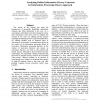Free Online Productivity Tools
i2Speak
i2Symbol
i2OCR
iTex2Img
iWeb2Print
iWeb2Shot
i2Type
iPdf2Split
iPdf2Merge
i2Bopomofo
i2Arabic
i2Style
i2Image
i2PDF
iLatex2Rtf
Sci2ools
107
click to vote
HICSS
2007
IEEE
2007
IEEE
Analyzing Online Information Privacy Concerns: An Information Processing Theory Approach
The advent of the Internet has made the transmission of personally identifiable information common and often inadvertent to the user. As a consequence, individuals worry that companies misuse their information. Firms have tried to mitigate this concern in two ways: (1) offering privacy policies regarding the handling and use of personal information, (2) offering benefits such as financial gains or convenience. In this paper, we interpret these actions in the context of the information processing theory of motivation. Information processing theories, in the context of motivated behavior also known as expectancy theories, are built on the premise that people process information about behavior-outcome relationships. We empirically validate predictions that the means to mitigate privacy concerns are associated with positive valences resulting in an increase in motivational score. Further, we investigate these means in trade-off situation, where a firm may only offer partially complete pri...
Biometrics | HICSS 2007 | Information Processing | Information Processing Theories | Personally Identifiable Information | System Sciences |
Related Content
| Added | 02 Jun 2010 |
| Updated | 02 Jun 2010 |
| Type | Conference |
| Year | 2007 |
| Where | HICSS |
| Authors | Il-Horn Hann, Kai Lung Hui, Sang-Yong Tom Lee, Ivan P. L. Png |
Comments (0)

